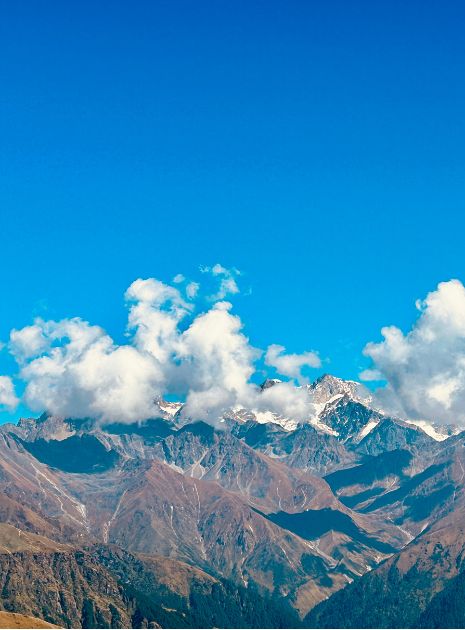Jilasu
Some places shout for attention. Others just wait, knowing the right eyes will find them. Jilasu is the second kind. You arrive here not because it was in a brochure, but because someone mentioned it over a cup of tea, and you decided to see for yourself.
The road in is never in a hurry. From Pokhari, it climbs, curls, and pauses under tall pine (चीड़) and cedar. Sometimes the wind smells of resin, sometimes of wet earth. In between, you pass a woman resting on a stone ledge, a bundle of grass beside her, her gaze following the clouds as if she is checking which way the weather will go.
The first hint you have reached is not a signboard. It is a child running barefoot down a lane, balancing a tin lunchbox, his voice echoing in the narrow path. Slate roofs appear, then the rhythm of work: the scrape of a sickle, the splash of water in a pail. You are already inside Jilasu before you realise you have arrived.
Officially, Jilasu became a tehsil in 2014, looking after 29 scattered villages. On paper, it has numbers: about 414 people in the main settlement, 99 households, with women a little more in number than men. In life, it has faces, like the shopkeeper who keeps your change ready before you even ask or the shepherd who greets you without slowing his pace.
The literacy rate is not high, but you see ambition in the way children walk to school even on cold mornings, fingers wrapped around their books like they are holding something warm.
At first light, the terraces are still wrapped in mist. Mandua (मंडुवा) stands dark and tall, rajma (राजमा) vines curl around their wooden stakes, and potatoes (आलू) lie hidden under damp soil. Farmers bend over rows, moving slowly, not because they are lazy but because the hill teaches patience.
Water does not rush here. It travels through narrow hand-dug channels, guided by small stones pressed into place. If a section leaks, someone fixes it on the way to the next field with no tools, just habit. By April, the wheat (गेहूं) turns gold and the wind sends a soft rustle across the slopes.
Roads exist, but the soul of Jilasu is in its footpaths. Narrow tracks run past haystacks, between patches of बिच्छू घास (nettle), and along streams where children float paper boats in the monsoon.
These paths link Jilasu to Gwar, Rikhwari, and smaller hamlets whose names you only learn after staying a while. You meet neighbours along the way, sometimes a group carrying firewood, sometimes an old man leading a mule. The talk is short, a few words, then the journey continues.
If someone’s roof cracks after snow, the news travels fast. The next morning, two or three men arrive with slate tiles, women bring tea, and the work is done before the sun reaches its height.
There is no bustle here, just a few shops in a row. A grocer with jars of spices and lentils lined neatly. A tailor who works under a lightbulb swinging gently in the wind. A tea stall wherein steam curls into the air, sporting the odor of robust chai (चाय) and warm pakoras (पकोड़े).
The stall is where news travels. Someone’s niece got married, a leopard was seen close to the upper fields, and the road to the subsequent village may be blocked the following day for maintenance. Nobody leaves without understanding something they did not know when they got here.
Jilasu’s faculty is just one constructing, a little worn at the corners. A crooked flagpole stands in front, paint peeling, but nevertheless shiny, while the solar catches it. Inside, benches are smoothed with the aid of years of elbows. The blackboard is scratched, but it does its job.
When instructions give up, youngsters spill into the courtyard. Some run domestic, some wander to the market. Learning does not stop while college does. At home, parents check homework at the same time as elders tell stories that carry their own kind of know-how.
Harela (हरेला) comes with little pots of green, seedlings planted in courtyards, blessed with quiet prayers. Makar Sankranti (मकर संक्रांति) means kitchens complete of singal (सिंगल), arsa (अर्सा), and gulgula (गुलगुला). The chocolates pass from house to residence until no one remembers who made which batch.
Weddings fill the air with the thump of ढोल-दमाऊं (dhol-damau). Guests sit in a circle, consuming from brass plates, the scent of ghee and spices growing into the cold air. Fields are left alone for a day due to the fact that the work will wait.
Winter mornings placed frost (पाला) on the grass, and your breath formed little clouds. Summer brings hot days; however, evenings are cool enough for a sweater. Monsoon turns the hills into a patchwork of deep inexperienced, streams jogging so loud they become the backdrop to each verbal exchange.
Birds are the calendar here. Koel (कोयल) in spring, sparrows (गौरैया) hopping by the grain stores, and kites (चील) riding the thermals high above.
You do not leave Jilasu with souvenirs. You go away with the taste of chai shared below a tree, the sound of toes on a stone direction, and the sight of mist rolling over the ridge. You go away with the reminiscence of neighbours who deal with you like you belong, even if you had been only passing through.
Jilasu stays within the thoughts quietly, like a 1/2-remembered track. You may forget its numbers, but you will remember its mornings, and that is enough.
| All Sub Districts | ||
|---|---|---|
| Jilasu | Joshimath | Karnaprayag |
| Nandaprayag | Narayan Bagar | Pokhari |

Uttarakhand is not simply another country. People here name it Devbhoomi (देवभूमि), the Land of the Gods. And it feels that way. Rivers begin right he......
See Details